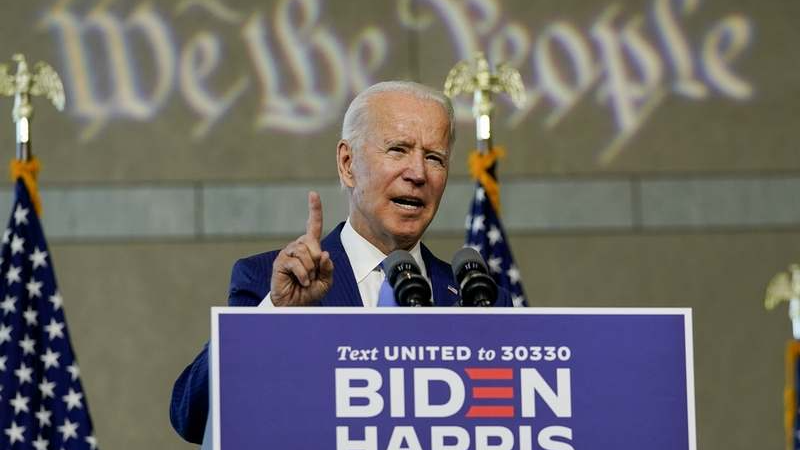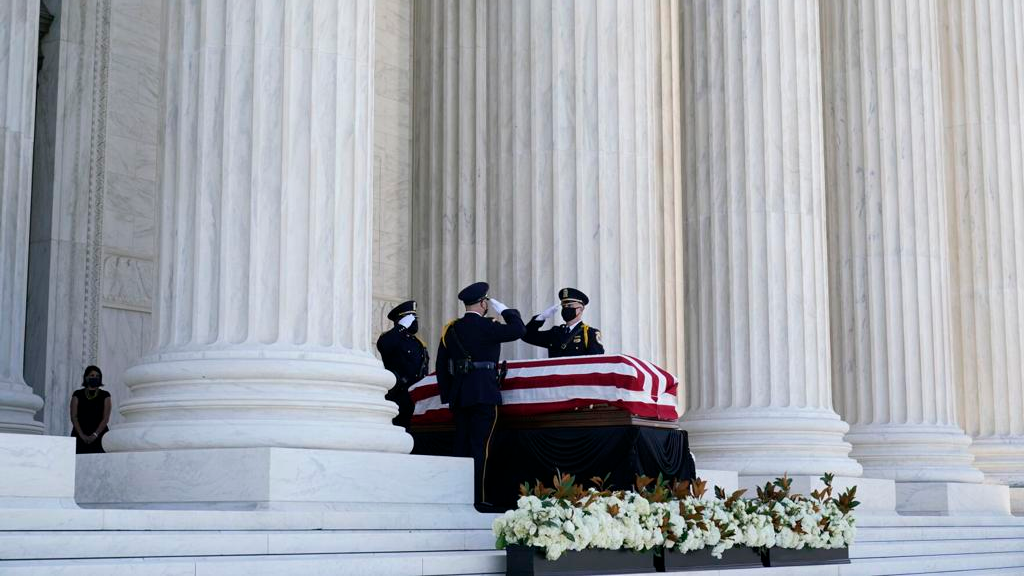
U.S. Democratic presidential candidate and former Vice President Joe Biden gestures while speaking at the Constitution Center in Philadelphia, about the Supreme Court, September 20, 2020. /AP
U.S. Democratic presidential candidate and former Vice President Joe Biden gestures while speaking at the Constitution Center in Philadelphia, about the Supreme Court, September 20, 2020. /AP
Editor's note: Freddie Reidy is a freelance writer based in London. He studied history and history of art at the University of Kent, Canterbury, specializing in Russian history and international politics. The article reflects the author's opinions and not necessarily the views of CGTN.
With six weeks to go until the presidential election, the race is still too close to call. Joe Biden may be ahead in the national polls, but his numbers are dipping in some vital battleground states, namely Florida and Pennsylvania. The death of Supreme Court Justice, Ruth Bader Ginsburg, also presents the Biden campaign with an awkward situation.
The former vice president has not entered the bipartisan fray over her successor, fearing the issue will remain a major distraction from core campaign messages. When asked his opinion on the matter, Biden responded, "Let's say [if] I answer that question, then the whole debate's going to be about what I said or didn't say."
Expanding on his reticence, Biden pointed to President Donald Trump's preference for shifting the debate, "He never wants to talk about the issue at hand, and he always tries to change the subject." It is certainly easier to court your own base on a nomination and avoid thornier cross-party issues such as the COVID-19 response.
Biden has arguably framed the campaign as a referendum on Donald Trump's tenure. It has kept his "big tent" credentials intact, trying to appeal to as many Democrats, undecided voters and disaffected Republicans as possible.
The utility of the issue of the vacant Supreme Court seat to Trump is clear though. What better insurance policy against "crazy liberals" than a second term and a conservative majority in the Supreme Court?
Some Democrats have vowed to increase the number of seats in the Supreme Court, in an effort to "stack" the bench with liberal judges. Biden is wise to have avoided this idea. What could play into Trump's rhetoric more effectively than advocating a change to the Supreme Court's makeup to satisfy a political agenda?
The trouble for Biden is the issue has fired up both sides. "Fill that seat" can be heard chanted at Trump rallies. The president has made the most of the opportunity by also shrewdly vowing to nominate a female successor, in a bid to shore-up polling numbers with skeptical Republican female voters.
On the Democrat side too, tens of millions of dollars have poured into campaign coffers in response to the prospect of a Trump appointee. Ruth Bader Ginsburg died at 87, and the favorite to succeed her, Amy Coney Barrett is only 48, so the appointment is sure to have long-lasting consequences.

The flag-draped casket of the late U.S. Supreme Court Justice Ruth Bader Ginsburg arrives at the Supreme Court in Washington D.C., September 23, 2020. /AP
The flag-draped casket of the late U.S. Supreme Court Justice Ruth Bader Ginsburg arrives at the Supreme Court in Washington D.C., September 23, 2020. /AP
The threat of such an appointment might help Biden win critical support from the left fringe of his party, but Democratic Party threats of "stacking the bench" could also bring about an equal turnout boost for the GOP.
The difficulty Biden faces is that the Supreme Court nomination issue is gaining more interest and traction than his presidential campaign. Trump has embraced the matter as a rallying call to conservatives. Conversely, Biden's call for debating the issues brought to the Supreme Court, such as healthcare, are decidedly less newsworthy.
Biden has a two-fold problem. Hillary Clinton believed her policy experience would expose Trump's inexperience, and it did; Clinton outperformed Trump on policy during the debates. The issue Hillary faced is that the election wasn't fought on policy, and the same is true today. This leads to Biden's second challenge: The policies he is pushing are those of the Obama-era; people have heard them before and have been hearing about them since 2008.
Donald Trump was able to turn Hillary's experience against her and present her as an establishment figure, out of touch and elitist. Again, this remains the case; the Democrats latching on to endorsements by John McCain's wife Megan, or criticism from Mitt Romney is not enough to convince a nation you have a powerful and hopeful vision for America.
Biden must steer Democrats away from battles that are already lost and focus attention on the greater war at hand. Just as the doomed campaign to impeach Trump failed, despite a Republican-majority Senate, so too, will attempts to prevent a Supreme Court nomination.
If Biden is to succeed, he will need to inject a powerful and compelling "liberal value" flavor to his campaign – values which could inform U.S. policy on how the nation looks after its citizens during a pandemic and secures a brighter future. Becoming further embroiled in partisan skirmishes serves no purpose, and remaining aloof is not a viable long-term proposition for a candidate many struggle to be enthused about.
(If you want to contribute and have specific expertise, please contact us at opinions@cgtn.com.)